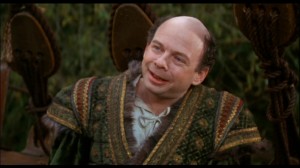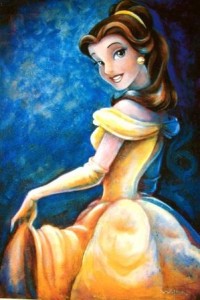âHarry Potterâ and The Issues Beyond Fiction, Part 1
Just when you were disappointed â or perhaps rejoiced â that the very last Harry Potter film releases next Friday, along came author J. K. Rowling to quoth, âPottermore.â Even before that, surely the Boy (Wizard) Who Lived isnât dying anytime soon.
Yet recently Iâve concluded that thinking Biblically about Harry Potter applies to more than just how Christians respond to that series and its popularity.
First, it matters because people will have similar questions about other popular books. More recently that included Twilight and anything else with angsty vampires and other critters on the front covers. Now itâs dystopian or post-apocalyptic themed novels. The questions will be the same: Does this honor God? Doesnât He hate witchcraft? What about all this dark stuff? Can one really âredeemâ stories like this? What if others use them to sin?
 Not to spoil the ending, but I am a Potter reader, a film viewer, and do consider myself a fan. However, I donât want to practice a behavior Iâve seen in myself and other Christian Harry Potter fans: as if their loudest battle cry is âThose legalists are coming to ban our Potter books!â Instead of reaction, our goal should be proactive honoring of Christ.
Not to spoil the ending, but I am a Potter reader, a film viewer, and do consider myself a fan. However, I donât want to practice a behavior Iâve seen in myself and other Christian Harry Potter fans: as if their loudest battle cry is âThose legalists are coming to ban our Potter books!â Instead of reaction, our goal should be proactive honoring of Christ.
Yet Potter discernment questions also count beyond personal fiction preferences, or what parents decide to let their children read, or what pastors may say about this particular series.
This issue matters because of how we live our faith. Whoâs truly in charge of our universe? Can Satan call âdibsâ on an object, a Thing? Is âgarbage in, garbage outâ a true axiom? Is practicing discernment only âlegalism,â or always Biblical?
Here are the first of 14 reasons why the Harry Potter debate matters.
1. Because we need to define âwitchcraftâ Biblically.
Most Christians concerned about books like Harry Potter love Jesus, love His Word, and very rightly see that too many professing Christians are not even trying to apply Biblical discernment in their media choices. Thatâs a real problem, worth Gospel-based response.
Yet the prevalence of othersâ failure to practice Biblical discernment does not mean that any concept (or the strictest practice!) of discernment is thus Biblical. Some âdiscernmentâ is based not on God-exalting thinking, but âfolk theologyâ that only seems Biblical. Many talking points about Harry Potter fall into this category.
Of course, it does make perfect sense to avoid Harry Potter or other things if you truly have a personal-background, Romans-14 conscience issue about anything labeled âmagic.â Occult practices and rejection of Christ are very real and risky. God warns against them, and not only in an Old-Testament, Law-of-Moses, so-called âlegalisticâ way. Thus, true Christians, if they want to be like the Christ Who saved them, will avoid practicing mystical junk. That could involve throwing out books of magic arts (Acts 19). Donât get into that stuff.
But how should we understand witchcraft? Any definition shouldnât come from âfolk theology,â or passing resemblances, but Scripture itself. And throughout both Testaments, Scripture always defines witchcraft as actual pagan practice of false religion and even idol-worship that dishonors God. That includes trying to talk with spirits. Favoring mysticism above Godâs Word. Cutting up or tattooing your body like the Canaanites did.
One might ask: do the following concepts fit inside the Biblical category of actual witchcraft? Or do they originate from popular culture, historic folklore, or perceptions of âmagicâ?
- Whimsical flying broomsticks.
- Cauldrons and potions with magical effects.
- âWizardsâ who wear pointy hats and dress in long, shining robes.
- Disappearing from one place to appear almost instantly in another.
- Creatures such as werewolves, trolls, baselisks, centaurs, elves, goblins, and dragons.
With care, I would suggest that if you, even subtly, consider these things as exactly the same as Biblically defined practice of pagan occultism, you may have accidentally bought into some pop-culture notions yourself â and then have read those back into the Bible.
2. Because of where Scripture says sin really comes from.
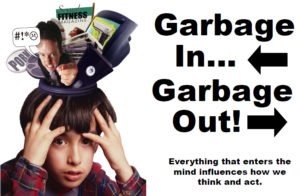
True in computer programming, maybe even for Community Standards. But apart from Christ, the human heart is the real garbage producer (Mark 7).
Throughout many admonitions to reject Harry Potter books, or some kinds of music, or âthe appearance of evilâ (an out-of-context twisting of 1 Thessalonians 5:22), is this assumption:
To honor God and keep yourself pure, avoid the bad Things. âGarbage in, garbage out.â
Oddly enough, this is one of the few common beliefs shared by conservative and liberal professing Christians. Itâs the idea that sin comes from your Environment, outside yourself, while you personally are Neutral or even Basically Good.
But what does Scripture say about sinâs true source? It certainly doesnât come from a Thing.
[Jesus] called the people to him again and said to them, âHear me, all of you, and understand: There is nothing outside a person that by going into him can defile him, but the things that come out of a person are what defile him.â And when he had entered the house and left the people, his disciples asked him about the parable. And he said to them, âThen are you also without understanding? Do you not see that whatever goes into a person from outside cannot defile him, since it enters not his heart but his stomach, and is expelled?â (Thus he declared all foods clean.) And he said, âWhat comes out of a person is what defiles him. For from within, out of the heart of man, come evil thoughts, sexual immorality, theft, murder, adultery, coveting, wickedness, deceit, sensuality, envy, slander, pride, foolishness. All these evil things come from within, and they defile a person.â
â Mark 7: 14-23 (boldface emphases added)
Though I can appreciate the intent behind a phrase like âgarbage in, garbage out,â Jesus Himself might voice disagreement with that. Sin doesnât come from a Thing. It comes from the human heart. To believe otherwise is not only to agree with the Pharisees â and who wants to do that? â but to contradict Christ.
So if Iâm using the Harry Potter books or any other Thing to sin, I canât blame the Thing. I can only blame myself and my heart desires.
Sure, a Thingâs author or creator may be an unforgiven sinner, and very likely was sinning even while making the Thing. Apart from faith, everything is a sin, as says Romans 14:23.
But I canât use that person or Thing as a âscapegoatâ for my own sin. Similarly, if I have a sinful thought after seeing a scantily clad someone â yes, that person may be responsible for dressing with wrong motives, but I canât blame her even partly for that sin. It is just as much a sin to make her a scapegoat. Iâm responsible for that sin.
And only One true sacrifice took that sin on Himself, suffering Godâs wrath in place of all people who would then become His children.
3. Because of Godâs commands for Christians to practice truth.
âWitchcraft manuals,â accuses one site. Elsewhere the same writer calls Harry Potter âSatanâs books.â Similarly, âThese books were taken into homes everywhere with a real evil spirit following each copy to curse those homes,â wrote one âdiscernmentâ blogger.
Bypassing the question of how anyone but God can know what the Devil is doing, why do so many Christians , surely even with good intentions, tell lies about Harry Potter?
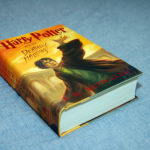 Iâm not sure how to soften that point. Itâs simply bearing false witness to say that the books are âwitchcraft manualsâ (unless you believe the âapparatingâ or riding a flying broom really is possible and thus the booksâ instructions about these practices are real). Itâs at best bizarre to claim special knowledge of the Devilâs specific agenda. Itâs slanderous to say the stories contain descriptions of wicked activity and âhuman sacrificeâ without also saying itâs the bad guys who do that. And, again, itâs Scripturally squishy to say that Satan can own a thing.
Iâm not sure how to soften that point. Itâs simply bearing false witness to say that the books are âwitchcraft manualsâ (unless you believe the âapparatingâ or riding a flying broom really is possible and thus the booksâ instructions about these practices are real). Itâs at best bizarre to claim special knowledge of the Devilâs specific agenda. Itâs slanderous to say the stories contain descriptions of wicked activity and âhuman sacrificeâ without also saying itâs the bad guys who do that. And, again, itâs Scripturally squishy to say that Satan can own a thing.
Yes, some may ignore real enemies. Still, we must tell the truth, even about the bad guys.
Would you also be surprised to learn that in the Harry Potter books, no one tries to talk with or use demonic spirits of any kind? Or that âdivinationâ as a school subject is viewed as absurd and ridiculous, hardly worth bothering about? Or that no main-character âwizardingâ family is shown as divorced, but in fact Family Values shine surprisingly bright in the series?
Next week: what kind of rules help or harm Christians? Is âsomeone else used it to sinâ a Biblical motive for discernment? How might mysticism sneak into even Potter avoidance?








































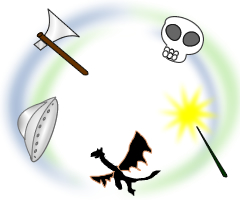


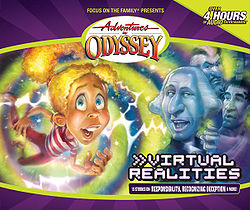 So how did they make it?
So how did they make it?